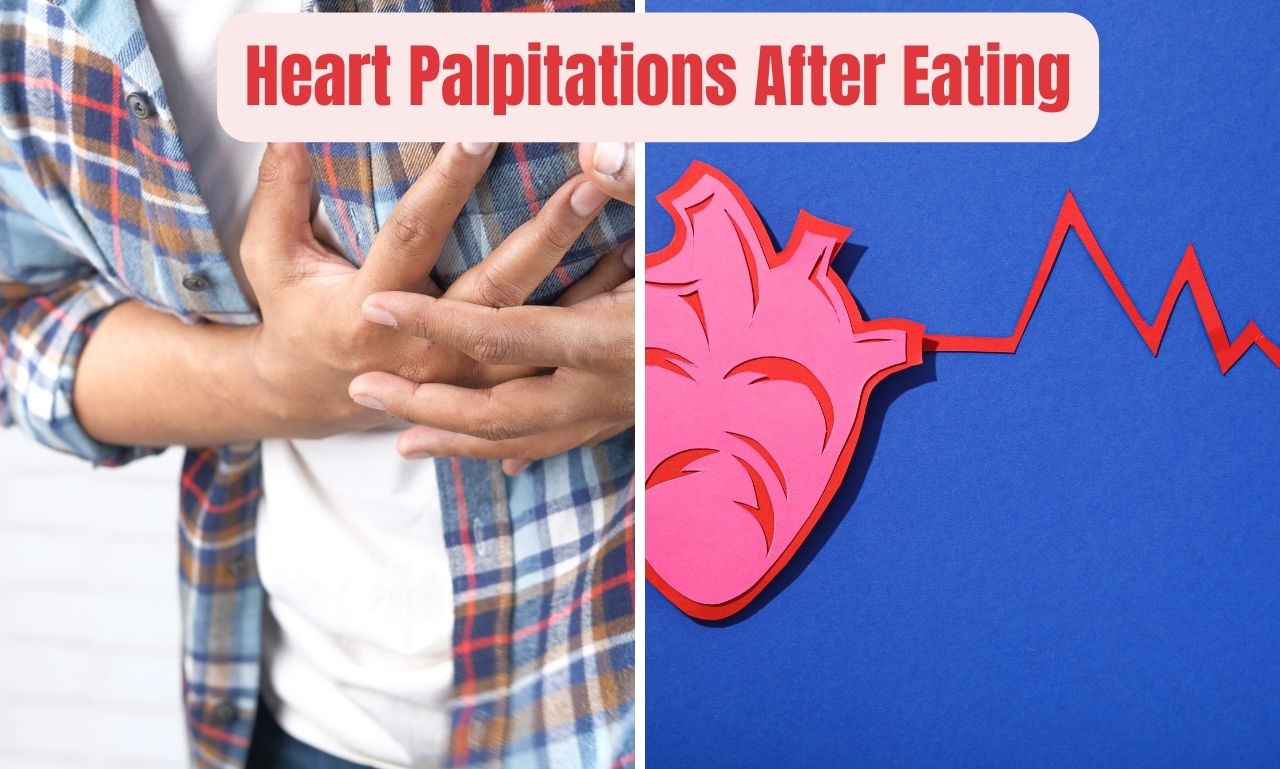Heart palpitations after eating can be alarming. They often result from dietary choices or underlying health conditions.
Experiencing heart palpitations after meals is not uncommon. Certain foods and beverages, like caffeine, alcohol, and high-sugar items, can trigger these sensations. Overeating or consuming large, heavy meals may also contribute to the problem. In some cases, underlying health issues such as gastroesophageal reflux disease (GERD), anxiety, or heart conditions might be the cause.
It is crucial to identify the specific triggers and consult with a healthcare professional if palpitations persist. Adjusting your diet, eating smaller meals, and avoiding known triggers can help manage and reduce the occurrence of heart palpitations after eating.
What Triggers Heart Palpitations Post-meal?
Heart palpitations after eating can be startling. They often feel like your heart is racing or skipping beats. Understanding the triggers can help you manage and prevent these occurrences.
Common Foods And Ingredients
Certain foods and ingredients are known to trigger heart palpitations. These include:
- Caffeine: Found in coffee, tea, chocolate, and energy drinks. Caffeine stimulates the heart.
- Alcohol: Can cause an irregular heartbeat in some individuals.
- Sugar: High sugar intake can lead to blood sugar spikes and palpitations.
- Monosodium Glutamate (MSG): Often found in processed foods and can affect heart rhythm.
- High-Sodium Foods: Salt can increase blood pressure and heart rate.
Keeping a food diary can help identify specific triggers. Avoiding these foods may reduce heart palpitations.
Impact Of Overeating
Overeating can also lead to heart palpitations. When you eat too much, your stomach expands, pressing against other organs. This can cause your heart to work harder, leading to palpitations.
To avoid overeating:
- Eat smaller meals: Spread your food intake throughout the day.
- Chew slowly: Take your time to chew and digest food properly.
- Stay hydrated: Drink water before meals to feel full faster.
Following these tips can help prevent heart palpitations related to overeating.
| Trigger | Effect on Heart |
|---|---|
| Caffeine | Increases heart rate |
| Alcohol | Can cause irregular heartbeat |
| Sugar | Leads to blood sugar spikes |
| MSG | Affects heart rhythm |
| High-Sodium Foods | Increases blood pressure and heart rate |

Credit: newyorkcardiac.com
The Connection Between Digestion And Heart Rate
Heart palpitations after eating can be alarming. Understanding the link between digestion and heart rate is essential. The body’s response to food can affect the heart in several ways.
Vagus Nerve Stimulation
The vagus nerve plays a crucial role in regulating heart rate. This nerve runs from the brainstem to the abdomen. It connects to various organs, including the heart and digestive system.
When you eat, the vagus nerve gets stimulated. This can affect the heart rate. Sometimes, this stimulation can cause heart palpitations. These are often harmless but can be unsettling.
Blood Flow Dynamics
During digestion, the body increases blood flow to the stomach and intestines. This helps in breaking down and absorbing food. The heart works harder to pump more blood to these areas.
This increased workload on the heart can cause heart palpitations. The body needs to balance blood flow between the digestive system and other organs. This balancing act can sometimes lead to noticeable changes in heart rate.
Understanding these connections helps in managing and reducing heart palpitations after eating.
Specific Conditions Linked To Post-meal Palpitations
Experiencing heart palpitations after eating can be alarming. These irregular heartbeats may be due to specific conditions. Understanding these can help manage the symptoms better. Let’s explore some common conditions linked to post-meal palpitations.
Acid Reflux And Gerd
Acid reflux and GERD can cause heart palpitations after eating. When stomach acid moves up into the esophagus, it can irritate the heart. This irritation may trigger palpitations.
Common symptoms of acid reflux and GERD include:
- Heartburn
- Chest pain
- Bloating
- Burping
Managing acid reflux involves avoiding spicy and fatty foods. Eating smaller meals and not lying down after eating can also help.
Food Allergies And Intolerances
Food allergies and intolerances can also lead to palpitations. The body reacts to certain foods, causing symptoms like palpitations.
Common food allergens include:
- Peanuts
- Shellfish
- Milk
- Eggs
Food intolerances, like lactose intolerance, can also cause palpitations. Symptoms may include:
- Stomach pain
- Bloating
- Diarrhea
Identifying and avoiding trigger foods is crucial. Keeping a food diary can help pinpoint the cause.
How Anxiety And Stress Play A Role
Heart palpitations after eating can be unsettling. Often, anxiety and stress play a significant role in these episodes. Understanding this connection can help manage and reduce these occurrences.
Emotional Eating
Emotional eating involves consuming food in response to feelings rather than hunger. Stress and anxiety are common triggers for this behavior. When stressed, people may crave comfort foods high in sugar and fats. These foods can cause rapid changes in blood sugar levels, leading to heart palpitations.
Here is a breakdown of how different emotions impact eating:
| Emotion | Type of Food Craved |
|---|---|
| Stress | Sugary and fatty foods |
| Anxiety | Carbohydrates and sweets |
| Sadness | Comfort foods like ice cream |
Stress Response And The Heart
The body has a natural stress response mechanism. When stressed, the brain releases hormones like adrenaline. These hormones increase heart rate and blood pressure. Eating during stress can amplify this response, causing heart palpitations.
Key factors of the stress response include:
- Release of adrenaline
- Increased heart rate
- Elevated blood pressure
- Rapid breathing
Combining stress with heavy meals can overwork the heart. This can lead to more frequent palpitations. Managing stress through relaxation techniques can help. Breathing exercises, meditation, and physical activity are effective ways to reduce stress levels.
Understanding the link between stress, anxiety, and heart palpitations is crucial. It allows for better management of these unsettling episodes. Reducing stress and eating mindfully can significantly lower the risk of palpitations after meals.
Examining The Role Of Caffeine And Alcohol
Heart palpitations can be alarming, especially after eating. Two common culprits are caffeine and alcohol. Both substances can affect the heart in various ways. Understanding their impact can help you manage and prevent palpitations.
Caffeine’s Effect On The Heart
Caffeine is found in coffee, tea, chocolate, and many soft drinks. It’s a stimulant that can increase your heart rate. Some people are more sensitive to caffeine than others. Even a small amount can cause heart palpitations.
High doses of caffeine can lead to a condition known as caffeine-induced arrhythmia. This condition causes irregular heartbeats. The best way to avoid this is to limit your caffeine intake. Drink decaffeinated beverages if you are prone to palpitations.
| Beverage | Average Caffeine Content (mg) |
|---|---|
| Regular Coffee (8 oz) | 95 |
| Black Tea (8 oz) | 47 |
| Energy Drink (8 oz) | 80 |
| Soft Drink (12 oz) | 30 |
Alcohol’s Contribution To Palpitations
Alcohol can also trigger heart palpitations. Even small amounts can have this effect. Alcohol affects the electrical signals in your heart. This can lead to an irregular heartbeat.
Some people experience holiday heart syndrome. This happens after drinking alcohol during holidays or parties. Symptoms include palpitations and a rapid heart rate.
If you notice palpitations after drinking alcohol, consider reducing your intake. Drink water between alcoholic beverages to stay hydrated. This can help reduce the risk of palpitations.
- Limit alcoholic drinks to reduce palpitations.
- Stay hydrated by drinking water.
- Monitor your heart rate after consuming alcohol.
When To Seek Medical Attention
Experiencing heart palpitations after eating can be unsettling. While they are often harmless, there are times when you should seek medical attention. Understanding these critical moments can help you make informed decisions about your health.
Symptoms Warranting A Doctor’s Visit
Heart palpitations can be a sign of a more serious condition. Visit a doctor if you experience the following symptoms:
- Dizziness or lightheadedness
- Chest pain or discomfort
- Shortness of breath
- Fainting or near-fainting episodes
- Rapid or irregular heartbeat lasting more than a few minutes
These symptoms may indicate an underlying health issue. It’s essential to get them checked out promptly.
What To Expect During The Evaluation
When you visit a doctor for heart palpitations, expect a thorough evaluation. This typically involves:
- Medical History: Your doctor will ask about your symptoms and medical history.
- Physical Exam: A physical exam will help identify any obvious issues.
- Electrocardiogram (ECG): This test measures the electrical activity of your heart.
- Blood Tests: These can help identify any underlying conditions, such as thyroid problems.
- Holter Monitor: You may need to wear a monitor that records heart activity for 24-48 hours.
These steps help the doctor determine the cause of your palpitations and the best course of action. Early evaluation can prevent potential complications.
| Symptom | Potential Concern |
|---|---|
| Chest Pain | May indicate a heart attack |
| Shortness of Breath | Could signal heart failure |
| Dizziness | Possible arrhythmia or low blood pressure |
Practical Tips For Relief And Prevention
Experiencing heart palpitations after eating can be unsettling. Knowing how to manage and prevent them can bring peace of mind. Here are some practical tips for relief and prevention.
Dietary Adjustments
Making smart dietary adjustments can significantly reduce heart palpitations. Consider the following changes:
- Limit caffeine and alcohol as they can trigger palpitations.
- Avoid large meals; eat smaller, more frequent portions.
- Reduce high-sugar foods which can spike blood sugar levels.
- Increase intake of magnesium-rich foods like spinach and nuts.
- Stay hydrated by drinking plenty of water throughout the day.
Mindful Eating Practices
Practicing mindful eating can help in managing heart palpitations. Here are some tips:
- Eat slowly and chew your food thoroughly.
- Maintain a calm and relaxed environment while eating.
- Avoid eating on the go; sit down for your meals.
- Listen to your body and stop eating when you feel full.
- Take deep breaths before and during meals to stay relaxed.
These tips can help you manage heart palpitations and enjoy your meals without worry.

Credit: m.facebook.com
Lifestyle Changes For A Healthier Heart
Heart palpitations after eating can be alarming. Fortunately, making certain lifestyle changes can help. By incorporating regular exercise and stress management techniques, you can promote a healthier heart.
Regular Exercise
Engaging in regular physical activity strengthens the heart. It also improves blood circulation. Start with simple exercises like walking or jogging. Aim for at least 30 minutes of moderate activity most days of the week.
- Walking: Easy and free. Walk in your neighborhood or a park.
- Jogging: Great for cardiovascular health. Jog at your own pace.
- Swimming: Low-impact and effective. Swim laps or join a class.
- Cycling: Fun and beneficial. Ride a bike around your area.
Consistency is key. Make exercise a part of your daily routine. It helps reduce heart palpitations and boosts overall health.
Stress Management Techniques
Stress can trigger heart palpitations. Learning to manage stress is crucial. Practice relaxation techniques to calm your mind and body.
- Deep Breathing: Sit comfortably. Take slow, deep breaths. Focus on your breath.
- Meditation: Spend a few minutes in quiet meditation. Clear your mind.
- Yoga: Combines physical and mental exercises. Join a class or follow online videos.
- Hobbies: Engage in activities you enjoy. It can be reading, painting, or gardening.
Managing stress effectively can reduce the frequency of heart palpitations. It also promotes mental and emotional well-being.
:max_bytes(150000):strip_icc()/can-gerd-cause-heart-palpitations-5194091-FINAL-44275b72a6bd4e2cbfa3499c8ab6c69b.jpg)
Credit: www.verywellhealth.com
Frequently Asked Questions
Why Do I Get Heart Palpitations After Eating?
Heart palpitations after eating can occur due to large meals, caffeine, sugar, or food allergies. Consult your doctor.
When Should I Worry About Heart Palpitations?
Worry about heart palpitations if they last long, occur frequently, or cause chest pain, dizziness, or shortness of breath. Consult a doctor.
What Can Be Mistaken For Heart Palpitations?
Other conditions like anxiety, panic attacks, dehydration, hyperthyroidism, and caffeine intake can be mistaken for heart palpitations.
What Vitamin Deficiency Causes Heart Palpitations?
Vitamin B12 deficiency can cause heart palpitations. Ensure proper intake of B12-rich foods or supplements.
What Causes Heart Palpitations After Eating?
Certain foods, large meals, or eating too quickly can trigger heart palpitations.
Can Certain Foods Trigger Heart Palpitations?
Yes, foods high in sugar, caffeine, or spice can cause palpitations.
Are Heart Palpitations After Eating Dangerous?
Usually, they are harmless but consult a doctor if persistent.
How Can I Prevent Heart Palpitations After Meals?
Eat smaller meals, avoid trigger foods, and stay hydrated.
Do Food Allergies Cause Heart Palpitations?
Yes, food allergies can lead to palpitations.
Can Dehydration Cause Heart Palpitations After Eating?
Yes, dehydration can contribute to heart palpitations.
Conclusion
Understanding heart palpitations after eating can significantly improve your well-being. Identifying triggers and adopting healthier eating habits can help. If symptoms persist, consult a healthcare provider. Making informed dietary choices can reduce discomfort. Stay proactive about your heart health to enjoy meals without worry.
Take control of your health today.
Please visit our other website to see/buy/read more women best products.




